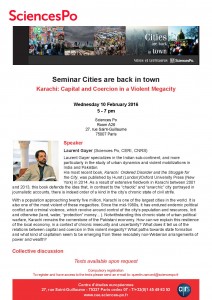« Karachi: Capital and Coercion in a Violent Megacity. »
Laurent Gayer
Mercredi 10 février 2016
17h-19h
|| Changement de salle || Sciences Po, salle A23
27 rue Saint-Guillaume (75007)
L‘inscription est obligatoire pour les externes à Sciences Po. Les inscriptions sont ouvertes jusqu’au mercredi 3 février 2016 à 15h. Pour vous inscrire, merci d’envoyer un mail à : quentin.ramond@sciencespo.fr.
Compulsory registration for the external people to Sciences Po. Registration is open until February, 3th 2016, 3 pm. Please send an email to : quentin.ramond@sciencespo.fr.
Pour les personnes externes à Sciences Po : Merci de veiller à vous présenter à l’accueil 10 minutes avant le début de la séance et de vous munir de vos papiers d’identité
For the external people to Sciences Po: You will have to arrive 10 minutes before the beginning of the seminar and to provide you with your identity papers.
Résumé de l’intervention :
With a population approaching twenty five million, Karachi is one of the largest cities in the world. It is also one of the most violent of these megacities. Since the mid-1980s, it has endured endemic political conflict and criminal violence, which revolve around control of the city’s population and resources, licit and otherwise (land, water, “protection” money…). Notwithstanding this chronic state of urban political warfare, Karachi remains the cornerstone of the Pakistani economy. How can we explain this resilience of the local economy, in a context of chronic insecurity and uncertainty? What does it tell us of the relations between capital and coercion in this violent megacity? What paths towards state formation and what kind of capitalism seem to be emerging from these resolutely non-Weberian arrangements of power and wealth?
Biographie :
Laurent Gayer is a senior research fellow at the Centre d’études et de recherches internationales (CERI-Sciences Po, Paris). He earned his PhD in political science from Sciences Po in 2004. He specializes in the Indian sub-continent, and more particularly in the study of urban dynamics and violent mobilizations in India and Pakistan. His most recent book, Karachi. Ordered Disorder and the Struggle for the City, was published by Hurst (London)/Oxford University Press (New York) in 2014. As a result of extensive fieldwork in Karachi between 2001 and 2013, this book defends the idea that, in contrast to the “chaotic” and “anarchic” city portrayed in journalistic accounts, there is indeed order of a kind in the city’s chronic state of civil strife.

